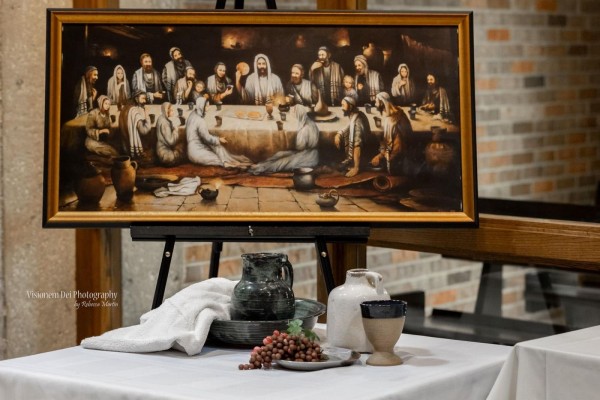
On Holy Thursday, we traditionally celebrate the Passover, the institution of the Eucharist, and the institution of the priesthood. The Holy Scriptures we read for this celebration invite us to reflect on these mysteries. The book of Exodus narrates the Passover when the people of Israel prepared for their journey out of slavery. That crucial moment right before they set out on the road to the promised land. A dream come true: freedom. The promised land for the people of Israel is freedom and abundance. God heard the cry of his people’s suffering. God, in his deep love for his people, did something unexpected: he found an ally, Moses, and faced the power of Pharaoh to free his people—a gesture of love and commitment to his covenant with his people. For us Christians of the 21st century, this holy night should help us reflect on the use of our freedom and the abundance that some of us enjoy and millions of people do not have. How can I, from my little corner of the world, push for the Lord’s dream and promise of a land of freedom and abundance for all to come true? Am I willing to partner with God to fight against the world’s injustices out of love for others?
Saint Paul’s letter to the Corinthians tells us the words of the Last Supper that Jesus shared with his followers. In that intimate moment of sharing, Jesus gives himself to us as food for the journey of life. In that gesture of love, Jesus leaves us, his disciples, a sign of total dedication so that we remember him every time we share the Eucharist. In a world where many fears and misinformation abound in social media, the Lord’s example reminds us to value the gift of self without fear and sincerity.
But the most unexpected thing about the celebration of Holy Thursday is the gospel we read. Every Holy Thursday, we are reminded that the Lord, while at the table with his disciples, put on a towel and began to wash his disciples’ feet. This was unexpected for his disciples, who had just experienced the triumphal entry into Jerusalem. They were acclaimed by those who awaited the “triumphant messiah.” Suddenly, in an unplanned moment, Jesus begins to wash the feet of each one of them. Judas, who betrayed him and sold him for 30 coins. Peter, who denied him when things became difficult. Thomas, who struggled to believe in the promise of the Resurrection. John and James, who wanted a place of power and honor. To all of them, one by one, Jesus washed their feet and showed them a love that overcomes all their flaws. His love for them is greater than their pettiness. As Jesus washes his disciples’ feet, he teaches that love in its purest form is service.
The unexpected actions of Jesus’ love for his disciples urge us to dream of a new world with freedom and abundance for all, not just for the few. Jesus’ unexpected self-gift in the Eucharist invites us to make our Christian lives a gift in service to our brothers and sisters. The humble and simple gesture of the teacher invites us to understand that authentic leadership is done in service. For followers of Jesus, the Eucharist discovers its most profound meaning when our lives are spent in service and dedication to others.









